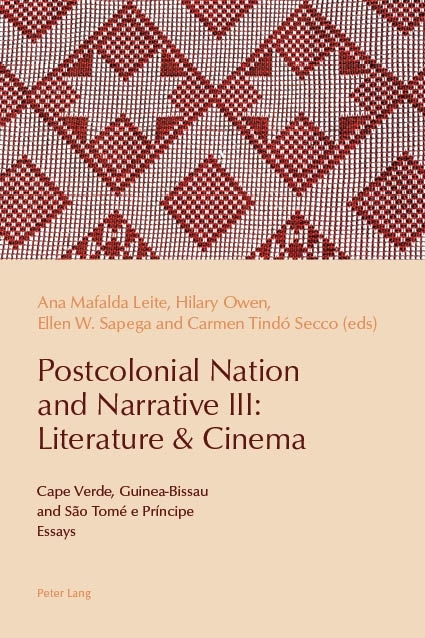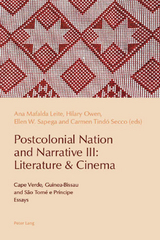Postcolonial Nation and Narrative III: Literature & Cinema
Peter Lang Ltd (Verlag)
978-1-78707-581-8 (ISBN)
Memory, history, migration and diaspora are core notions in the recreation and reconceptualization of the nation and its identities in Capeverdian, Guinean and Saotomean literary and cinematographic culture. Acknowledging that the idea of the postcolonial nation intersects with other social, political, cultural and historical categories, this book scrutinizes written and visual representations of the nation from a wide range of inter- and transdisciplinary perspectives, including literary and film studies, gender studies, sociology, and post-colonial and cultural studies. It makes a valuable contribution to current debates on postcolonialism, nation and identity in these former Portuguese colonies.
CONTENTS: Ana Mafalda Leite: Introduction: Postcolonial Nation and Narrative, Cinema and Literature – Paulo de Medeiros: Lusophone Cinemas in Transnational Perspective – Ute Fendler: African Cinema: A Transnational Cinema?: The Decolonial Cinema of Flora Gomes – Ellen W. Sapega: The ‘Sounds’ of Lusophony: The Question of Language in Two Films with Cape Verdean Themes – Sheila Khan: Between Realities and Scenarios: Duty and Authority to Narrate the Nation between Images – Carmen Lúcia Tindó Secco: José Carlos Schwarz’s Poetics and the Guinean Nation: Relations between Cinema, Literature, Music, Memory and History – Elena Brugioni: The Prayers of Mansata by Abdulai Sila: Performing the Postcolony – Joana Passos: Flora Gomes: Resilient Hope on Scant Chances – Jusciele Conceição Almeida de Oliveira and Mirian Tavares: Authorial Features in African Cinema: The Case of the Guinean Flora Gomes – Mark Sabine: Where Is Cabral? Postnational Culture and Liberation in Nha fala – Jane Tutikian: When the Chess Board Had Only White Pieces: A Study of Ilhéu de Contenda, the Book and the Film – Hilary Owen: In Search of the White Father: Filming the Island of Fogo in the Cinema of Pedro Costa and Leão Lopes – Doris Wieser: Wreckage, Fragments and Non-Places: The Life of Cape Verdean Immigrants in Cavalo Dinheiro by Pedro Costa – Jessica Falconi: Intertwining Histories: Documentary Narratives on São Tomé and Cape Verde – Kamila Krakowska: Zooming in on the Edges: Narratives of the Santomean Nation in the Documentaries of Ângelo Torres – Emanuelle Santos: After Nationalism: Literary Configurations of Contemporary Postcolonialities in Cape Verde, Guinea-Bissau and São Tomé e Príncipe – Luís Madureira: ‘Eva das Mil Pessoas’: Politics and Hyper-sexuality in Germano Almeida’s Eva
| Erscheinungsdatum | 05.03.2022 |
|---|---|
| Reihe/Serie | Reconfiguring Identities in the Portuguese-Speaking World ; 13 |
| Mitarbeit |
Herausgeber (Serie): Paulo De Medeiros, Cláudia Pazos-Alonso |
| Zusatzinfo | 8 Illustrations |
| Verlagsort | Witney |
| Sprache | englisch |
| Maße | 150 x 225 mm |
| Gewicht | 474 g |
| Themenwelt | Kunst / Musik / Theater ► Film / TV |
| Geisteswissenschaften ► Geschichte | |
| Geisteswissenschaften ► Sprach- / Literaturwissenschaft ► Anglistik / Amerikanistik | |
| Geisteswissenschaften ► Sprach- / Literaturwissenschaft ► Literaturwissenschaft | |
| Geisteswissenschaften ► Sprach- / Literaturwissenschaft ► Romanistik | |
| Sozialwissenschaften ► Kommunikation / Medien ► Medienwissenschaft | |
| Schlagworte | Alonso • Bissau • Cape • Cape Verde • Carmen • Cinema • Cláudia • Ellen • Guinea • Guinea Bissau • Hilary • Leite • Literature • Mafalda • Medeiros • narrative • Nation • Owen • Paulo • pazos • Postcolonial • postcolonial cinema • Postcolonial literature • príncipe • Sao Tome and Principe • Sapega • Secco • Tomé • Verde |
| ISBN-10 | 1-78707-581-8 / 1787075818 |
| ISBN-13 | 978-1-78707-581-8 / 9781787075818 |
| Zustand | Neuware |
| Haben Sie eine Frage zum Produkt? |
aus dem Bereich




